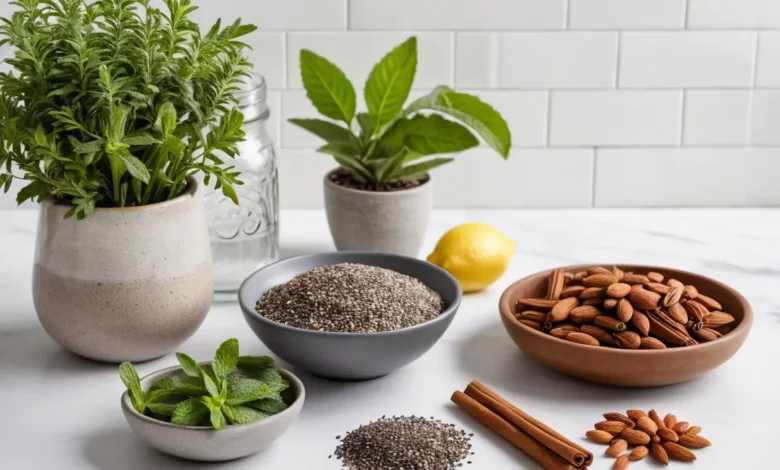How to Manage Blood Sugar Levels with Home Remedies

Maintaining stable blood sugar levels is crucial for overall health, especially for individuals managing diabetes or prediabetes. While medication and a balanced diet play essential roles in blood sugar control, many people are turning to natural home remedies to complement their management strategies. In this article, we’ll explore effective home remedies to help you manage blood sugar levels, provide valuable insights, and answer frequently asked questions about this vital topic.
Understanding Blood Sugar Levels
Blood sugar, or glucose, is the primary energy source for our bodies. When you eat, your body breaks down carbohydrates into glucose, which then enters the bloodstream. Insulin, a hormone produced by the pancreas, helps transport glucose from the blood into cells for energy. However, when blood sugar levels remain consistently high, it can lead to serious health issues like diabetes, heart disease, and nerve damage. Therefore, managing blood sugar levels effectively is essential.
1. Cinnamon
Cinnamon is more than just a delicious spice; it has been shown to have blood sugar-lowering effects. Studies suggest that cinnamon may enhance insulin sensitivity and improve glucose metabolism.
- How to Use: Add one teaspoon of ground cinnamon to your daily diet by sprinkling it on oatmeal, smoothies, or yogurt. Alternatively, you can take cinnamon supplements after consulting with a healthcare provider.
2. Apple Cider Vinegar
Apple cider vinegar (ACV) has gained popularity for its numerous health benefits, including blood sugar regulation. It may help improve insulin sensitivity and lower fasting blood sugar levels.
- How to Use: Mix one to two tablespoons of ACV in a glass of water and drink it before meals. Start with small amounts to assess your tolerance.
3. Fenugreek Seeds
Fenugreek seeds are known for their ability to lower blood sugar levels. They contain soluble fiber, which can slow down the absorption of carbohydrates.
- How to Use: Soak two tablespoons of fenugreek seeds in water overnight. Strain and eat the seeds in the morning, or grind them into a powder and add them to your meals.
4. Bitter Melon
Bitter melon has been used in traditional medicine to help manage blood sugar levels. It contains compounds that mimic insulin and may improve glucose uptake in the cells.
- How to Use: Consume bitter melon juice or cook it as a vegetable. You can also find bitter melon supplements at health stores.
5. Aloe Vera
Aloe vera is well-known for its healing properties, but it can also aid in blood sugar management. Studies have indicated that aloe vera gel can help lower fasting blood sugar levels in individuals with type 2 diabetes.
- How to Use: Consume two tablespoons of aloe vera gel daily, either directly from the plant or as a supplement.
6. Regular Exercise
Physical activity is vital for maintaining healthy blood sugar levels. Exercise helps your body use insulin more effectively and can lower blood sugar levels.
- How to Use: Aim for at least 150 minutes of moderate-intensity aerobic exercise per week, such as brisk walking, cycling, or swimming. Incorporate strength training exercises twice a week to enhance overall insulin sensitivity.
7. Stay Hydrated
Proper hydration plays a crucial role in blood sugar management. Water helps the kidneys flush out excess sugar through urine and can prevent dehydration, which may lead to elevated blood sugar levels.
- How to Use: Aim to drink at least eight glasses of water daily. Herbal teas and flavored water (without added sugars) can also contribute to your fluid intake.
8. Dietary Adjustments
What you eat significantly impacts your blood sugar levels. Incorporating whole foods and reducing processed sugars can help maintain stability.
- How to Use: Focus on a diet rich in whole grains, lean proteins, healthy fats, fruits, and vegetables. Limit sugary beverages, refined carbohydrates, and high-glycemic foods.
9. Sleep Quality
Lack of sleep can affect insulin sensitivity and lead to elevated blood sugar levels. Prioritizing good sleep hygiene can have a significant impact on your overall health and blood sugar control.
- How to Use: Aim for 7-9 hours of quality sleep each night. Establish a regular sleep routine and create a restful environment by minimizing distractions and reducing screen time before bed.
10. Manage Stress
Chronic stress can lead to elevated cortisol levels, which may contribute to higher blood sugar levels. Implementing stress-reducing techniques can help you manage your blood sugar more effectively.
- How to Use: Practice relaxation techniques such as deep breathing, meditation, yoga, or engaging in hobbies that help you unwind. Regular physical activity can also serve as a stress reliever.
Frequently Asked Questions About Blood Sugar Management
Q: What is considered a normal blood sugar level?
A: Normal fasting blood sugar levels typically range from 70 to 99 mg/dL. Levels between 100 to 125 mg/dL indicate prediabetes, while levels of 126 mg/dL or higher may indicate diabetes.
Q: Can I rely solely on home remedies to manage my blood sugar?
A: While home remedies can complement a diabetes management plan, they should not replace prescribed medications or professional medical advice. Always consult with a healthcare provider before making significant changes to your treatment plan.
Q: Are there specific foods I should avoid?
A: Yes, limit your intake of sugary foods, refined carbohydrates, and high-glycemic index foods. These can cause rapid spikes in blood sugar levels.
Q: How can I monitor my blood sugar levels effectively?
A: Regular monitoring with a glucose meter is essential for managing blood sugar levels. Follow your healthcare provider’s recommendations for testing frequency.
Q: Is it possible to reverse type 2 diabetes with lifestyle changes?
A: In some cases, individuals with type 2 diabetes can achieve remission through significant lifestyle changes, including weight loss, diet, and exercise. Consult with a healthcare professional for personalized guidance.
Conclusion: Empower Yourself for Better Blood Sugar Management
Managing blood sugar levels is crucial for maintaining your health, particularly for those with diabetes or prediabetes. By incorporating these natural remedies and lifestyle adjustments into your daily routine, you can support your body’s ability to regulate blood sugar effectively. Always consult your healthcare provider before making significant changes to your management plan, and stay informed about your condition to make empowered decisions.





